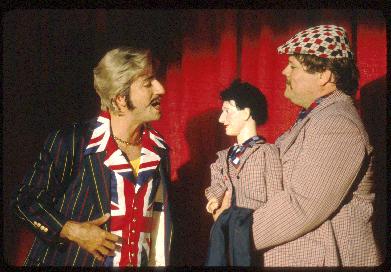
a word from our sponsors
Reviews
 |
 |
| Cymbeline recurs as farce in entertaining Shakespeare Santa Cruz production |
|
By Prospero
|
|
A more soothing and spectacular setting for nearly any activity than the University of California, Santa Cruz campus can hardly be imagined—particularly for seeing a play set in ancient Britain like Cymbeline. You mount a thousand-foot-high hill blanketed with bucolic meadows, following a long sloping curve that looks out over the town and the entire Monterey bay beyond, while the ramparts of a forest-shrouded campus-cum-hilltown beckon above. In late afternoon sea-fed mists are already filtering over the redwoods as you enter the sylvan scene. A passel of druids could round the corner at any time, to sweep you off to fairyland among them—or maybe you just wish they would. Parliament Hill must have seemed as mystical as this a couple millennia ago, you reckon, when great London was still but one of the dark places of the earth, an outpost of empire where Roman legions feared to tread. Into this ideal setting director Danny Scheie has plunked down a Cymbeline that, like an alarming number of Shakespeare Santa Cruz productions, pretty much turns its back on it. No Pre-Raphaelite visions of ancient Londinium for Scheie: instead, he turns for inspiration to TV land in its swinging 60s incarnation—the land of Laugh In, Bewitched, the Fab Four on Ed Sullivan, and an extra helping of the Vietnam War with your nightly news. TV monitors frame the stage to offer diverse perspectives on the action, and a sound system worthy of a digital multiplex sends forth pop-culture reverberations into the night. What Scheie turns this technology to is a slapstick, farcical Cymbeline replete with blackouts, double-takes, and characters poking their heads through the curtains—not to mention a vaudevillian ventriloquist and dummy to play Lords and Gentlemen 1 & 2 opposite Cloten.
All in all, this isn't a bad way to play Cymbeline, given the absurdly convoluted plot that sounds an awful lot like an extended joke when you try summarizing it to the unlessoned—as the woman behind me did to her companion before the performance started. It works well throughout, except for a slow patch just before intermission, and reminds you that the Comedy of Errors was Shakespeare's first version of Pericles, and by extension a prototype for all romances to follow. Scheie gets the British (with a capital B) theme of this play right—it was written and first performed in the heyday of James I's failed project to unite England and Scotland into a single kingdom—and finds apt modern means to express in a hodgepodge of 20th century equivalents: God Save the Queen blares in something like its Freddy Mercury or Sex Pistols versions, on a stage draped in modern British flags. What might to some scholarly playgoers seem sacrilegious is actually quite apt, given that the main proponents of the British ideal here are the two villains, the scabrous Cloten (played as a whiny soccer hooligan by Liam Vincent, who acquits himself well in a thankless role) and Cymbeline's stepqueen his conniving mother (given a nice dose of mini-skirted pizzazz by the estimable Amy Thone). Whatever James may have wanted, it's highly unlikely Shakespeare and his English audience would have treated Union with anything less than the ludicrous scorn we feel here. This production also makes you realize that perhaps the only way to play the more violent aspects of this play is as farce. Cloten's ludicrously abhorrent fantasy of raping Imogen and gaining her father's approval for it; his subsequent beheading by the King's long-ago-kidnapped son Guiderius, who casually carries it back on-stage for all to see; Imogen's reawakening beside Cloten's headless body, which she mistakes for her Posthumus her husband's, crying out 'O Posthumus, alas, where is thy head?': to play these actions as serious business never works anyway, and just defeats the opportunity to get the laugh they deserve. |
|
Part 2: Enter
Posthumus, streaking
|
|
Alma Mater
|
|
Long before an accident of destiny transformed him into the persona he feigns today, Prospero studied Shakespeare at Santa Cruz with a couple of world-class critics and scholars, Joe Barber and Harry Berger. He'd like to take this opportunity to introduce their books and essays—for both excelled more in short interpretive interventions than in great scholarly tomes—to an even wider public than they have so far enjoyed. Simply follow the links below to browse Barber and Berger's books on Amazon.com. C. L. Barber Harry Berger, Jr. |
 |
